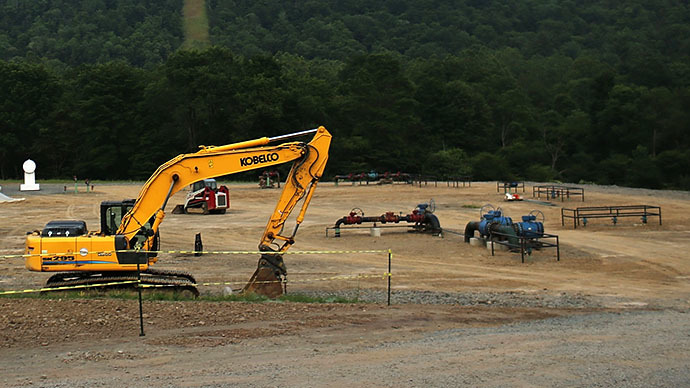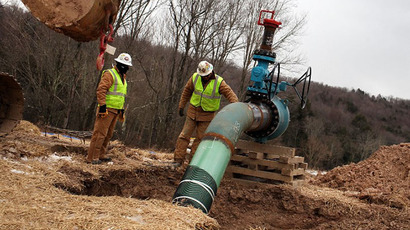Fracking chemicals disrupt human hormone functions, study claims

Researchers at the University of Missouri and the United States Geological Survey say that chemicals used in hydraulic fracturing, or fracking, could be causing serious hormonal disorders in humans.
A new report published in the latest edition of the journal Endocrinology examines a dozen chemicals used regularly in fracking — an increasingly commonplace practice of releasing natural gas from within the Earth by blasting a cocktail containing millions of gallons of water and other components deep underground.
The researchers say that there are hundreds of different ingredients used in various fracking formulas, but a considerable chunk of them are suspected of being endocrine disrupting chemicals, or EDCs — chemicals that can interfere with the human body’s endocrine functions and have been linked to heightened risks of cancer, low fertility rates and decreased sperm quality.
These chemicals “could raise the risk of reproductive, metabolic, neurological and other diseases, especially in children who are exposed to EDCs,” co-author Susan Nagel of the University of Missouri’s School of Medicine said in a statement released this week by The Endocrine Society.
"The rapid expansion in drilling operations utilizing hydraulic fracturing increases the potential for environmental contamination with the hundreds of hazardous chemicals used," her group’s report reads in part.
"With fracking on the rise, populations may face greater health risks from increased endocrine-disrupting chemical exposure,” Nagel said.
Speaking with RT, Nagel said that exposure to endocrine disrupting chemicals can have long term consequences stemming from cumulative exposure, "not necessarily the exposure that happens immediately in relation to acute effects."
She added the most worrying impacts of fracking, however, are
those we don’t yet know about.
“There is a real dearth of information on the health impacts
of this entire process.”
In order to examine what risks exist, the researchers conducted tests on 12 suspected or known EDCs used in fracking and measured their ability to influence the body’s reproductive hormones.
The researchers then gathered surface and ground water samples from various areas of Colorado — including the “drilling-dense” portion of Garfield County with over 10,000 active natural gas wells and other parts of the state that have been spared from heavy fracking.
Samples from the areas near more drilling sites had higher levels of EDC activity, The Endocrine Society wrote of the results, including a larger presence of chemicals known to disrupt both testosterone and estrogen.
Some of those samples from regions revealed to show a high trace of EDCs weren’t necessarily directly from fracking sites either, but from areas of Colorado where known spills have occurred.
“In comparison,” the group wrote, “little activity was measured in the water samples from the sites with little drilling.”
Now with public debate and federal scrutiny few and far between, the researchers fear that increased drilling activity could cause potentially alarming results down the line.
"Fracking is exempt from federal regulations to protect water quality, but spills associated with natural gas drilling can contaminate surface, ground and drinking water," Nagel said. "We found more endocrine-disrupting activity in the water close to drilling locations that had experienced spills than at control sites.”
The US Environmental Protection Agency is in the midst of what should be a six-year-long study on the potential environmental effects of fracking if it’s released on schedule in 2016. Meanwhile, the Independent Petroleum Association of America-funded Energy In Depth research project has published a response to the researchers’ report and call their findings “inflammatory.”
“It’s difficult to see the utility of this deeply flawed study as a means of better understanding the risks and benefits of shale development,” Energy In Depth said of the report.














